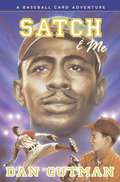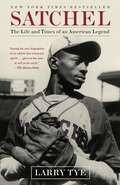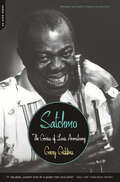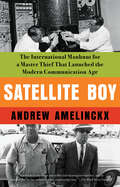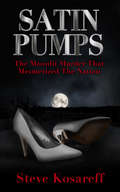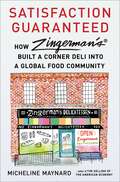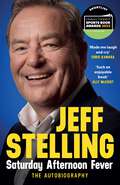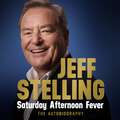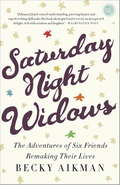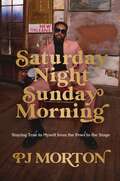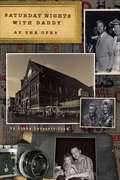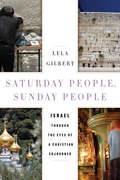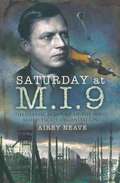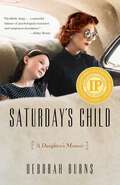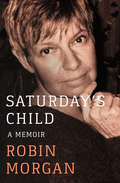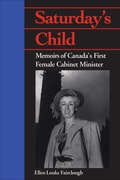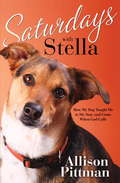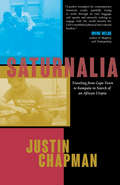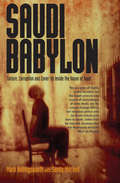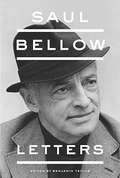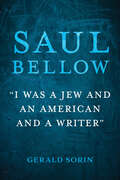- Table View
- List View
Satch & Me
by Dan Gutman"You wanna know who threw the fastest pitch ever?" Many baseball players claim that Satchel Paige was the fastest pitcher in the history of the game. Stosh and his coach, Flip Valentini, are on a mission to find out. With radar gun in tow, they travel back to 1942 and watch Satch pitch to power hitter Josh Gibson in the Negro League World Series. They soon learn that everything about Satch is fast--whether it's his talking, driving, or getaways. But is he really the fastest pitcher who ever lived? This baseball card adventure is a whirlwind of excitement, drama, and curveballs--starring one of the liveliest athletes in the game!
Satchel: The Life and Times of an American Legend
by Larry TyeHe is that rare American icon who has never been captured in a biography worthy of him. Now, at last, here is the superbly researched, spellbindingly told story of athlete, showman, philosopher, and boundary breaker Leroy "Satchel" Paige.Through dogged research and extensive interviews, award-winning author and journalist Larry Tye has tracked down the truth about this majestic and enigmatic pitcher. Here is the stirring account of the child born to a poor Alabama washerwoman, the boy who earned his nickname from his enterprising work as a railroad porter, and the young man who took up baseball on the streets and in reform school before becoming the superstar hurler of the Negro Leagues.In unprecedented detail, Tye reveals how Paige, hurt and angry when Jackie Robinson beat him in breaking the Majors' color barrier, emerged at the improbable age of forty-two to help propel the Cleveland Indians to the World Series. ("Age is a case of mind over matter," he said. "If you don't mind, it don't matter.")Rewriting our history of baseball's integration with Paige in the starring role and separating truth from legend, Satchel is a story as large as this larger-than-life man.
Satchmo: The Genius of Louis Armstrong
by Gary GiddinsGary Giddins has been called "the best jazz writer in America today" (Esquire). Louis Armstrong has been called the most influential jazz musician of the century. Together this auspicious pairing has resulted in Satchmo, one of the most vivid and fascinating portraits ever drawn of perhaps the greatest figure in the history of American music. Available now at a new price, this text-only edition is the authoritative introduction to Armstrong's life and art for the curious newcomer, and offers fresh insight even for the serious student of Pops.
Satellite Boy: The International Manhunt for a Master Thief That Launched the Modern Communication Age
by ANDREW AMELINCKXSpanning the underworld haunts of Montreal to Havana and Miami in the early days of the Cold War, Satellite Boy reveals the unlikely connection between an audacious bank heist and the &“other Space Race&” that gave birth to the modern communication ageOn April 6, 1965, Georges Lemay was relaxing on his yacht in a south Florida marina following one of the largest and most daring bank heists in Canadian history. For four years, the roguishly handsome criminal mastermind hid in plain sight, eluding capture and the combined efforts of the FBI, Interpol, and the Royal Canadian Mounted Police. His future appeared secure.What Lemay didn&’t know was that less than two hundred miles away at Cape Canaveral, a brilliant engineer named Harold Rosen was about to usher in the age of global live television with the launch of the world&’s first twenty-four-hour commercial communications satellite. Rosen&’s extraordinary accomplishment would not only derail Lemay&’s cushy life but change the world forever.Brimming with criminal panache and technological intrigue, and set against a turbulent and iconic period that includes the moon landing and the civil rights movement, Satellite Boy tells the largely forgotten, high-stakes story of the two equally driven men who inadvertently launched the modern era.
Satin Pumps: The Moonlit Murder That Mesmerized The Nation
by Steve KosareffThe true crime memoir about a 1950s doctor, his girlfriend, the murder of his wife, and the 3 trials that followed, written by one of his former patients.Did the handsome, wealthy doctor and his beautiful young paramour plan to kill his glamorous socialite wife? Or did the gun accidentally discharge as he claimed?Early in the evening on July 18, 1959, Dr. Bernard Finch and his girlfriend, Carole Ann Tregoff, drove from their Las Vegas love-nest to the Finch home in the Los Angeles suburb of West Covina to speak to his wife Barbara about obtaining a speedy divorce in Nevada. But the plan went awry, and the conversation turned deadly with Barbara&’s lifeless body ending up in her in-laws&’ backyard next door.After a high-speed chase with police, Finch was arrested the next morning in Las Vegas and charged with Barbara&’s murder. Then, during his court hearing in West Covina, Carole was arrested on the witness stand and charged as his accomplice. Soon others were named as part of a larger conspiracy. But who were they and what parts did they play in these deadly events?
Satisfaction Guaranteed: How Zingerman's Built a Corner Deli into a Global Food Community
by Micheline MaynardFrom an accomplished national journalist, a lively look at the inception, growth, future, and unique management style of Zingerman&’s—a beloved, $70 million-dollar Michigan-based specialty food store with global reach.Certain businesses are legendary, exerting immense influence in their field. Zingerman&’s in Ann Arbor, Michigan, is one of those places. Over the years the flagship deli has expanded into a community of more than a dozen businesses, including a wildly successful mail order operation, restaurants, bakery, coffee roastery, creamery, candy maker, and events space—transforming Ann Arbor into a destination for food lovers. Founded in 1982 by Paul Saginaw and Ari Weinzweig, Zingerman&’s philosophy of good food, excellent service, and sound finances has turned it into a company whose reach spans all corners of the gourmet food world. Famous for its generous deli sandwiches, fresh bread, and flavorful coffee—all locally produced—Zingerman&’s is also widely celebrated for its superb customer service and employee equity. The culture is one of respect and innovation, while maintaining very high standards. Every employee has access to the financial records, everyone has a voice, and everyone is heard. It has legions of enthusiastic customers, fans across the food world, and business principles and a work ethic that have been admired, analyzed, and copied. All that is revealed here, in Micheline Maynard&’s Satisfaction Guaranteed. Readers will discover how by 2019, Zingerman&’s employed hundreds of employees and achieved close to $70 million in annual sales. When the pandemic struck, Zingerman&’s growth momentarily screeched to a halt—but it survived by reinventing itself, while still serving its beloved food and selling its wide array of groceries. Now, as Zingerman&’s approaches its 40th anniversary, it is on track for stronger results than ever. A recipe for success in business and in life, Satisfaction Guaranteed provides a roadmap for manifesting joy and purpose in business.
Saturday Afternoon Fever: The Autobiography
by Jeff Stelling'Made me laugh and cry' Chris Kamara'Such an enjoyable book' Ally McCoist'Jeff's autobiography is a riot of humour and nostalgia. A great read' Phil Thompson'Saturday Afternoon Fever is great fun - right out of the top drawer' Paul MersonA profoundly personal, warmly nostalgic and deliciously funny memoir by the legendary Sky Sports anchorman Jeff Stelling, chronicling a life spent obsessing about 'The Beautiful Game' ever since he was a little boy, and underpinned by a deeply rooted love of football and of people.For a quarter of a century the iconic Sky Sports football presenter Jeff Stelling was the face and voice of football television. As the host of Soccer Saturday, a results show with National Treasure status, he expertly presided over a live panel of former footballers watching the most exciting sporting chapter of the weekend, on the telly, in front of a transfixed audience of millions, watching, unbelievably... on the telly.Beginning at midday and wrapping just after the Premier League's players had showered and changed, the show's popularity stitched Stelling into the fabric of match-day rituals up and down the country. For fans, the weekend didn't exist without an hour or four of Soccer Saturday.Saturday Afternoon Fever is Stelling's moving and fascinating memoir: a love letter to the game that has shaped and defined him, as it has millions of other football fans across the UK. This is the passionate, engaging tale of one fan's journey from the terraces at Hartlepool's rainy Victoria Park in the 1960s to the sleek and salubrious confines of the Sky Sports studios, an adventure that spans well over half a century and some of the most fast-changing, exciting periods in football's history.
Saturday Afternoon Fever: The Autobiography
by Jeff Stelling'Made me laugh and cry' Chris Kamara'Such an enjoyable book' Ally McCoist'Jeff's autobiography is a riot of humour and nostalgia. A great read' Phil Thompson'Saturday Afternoon Fever is great fun - right out of the top drawer' Paul MersonA profoundly personal, warmly nostalgic and deliciously funny memoir by the legendary Sky Sports anchorman Jeff Stelling, chronicling a life spent obsessing about 'The Beautiful Game' ever since he was a little boy, and underpinned by a deeply rooted love of football and of people.For a quarter of a century the iconic Sky Sports football presenter Jeff Stelling was the face and voice of football television. As the host of Soccer Saturday, a results show with National Treasure status, he expertly presided over a live panel of former footballers watching the most exciting sporting chapter of the weekend, on the telly, in front of a transfixed audience of millions, watching, unbelievably... on the telly.Beginning at midday and wrapping just after the Premier League's players had showered and changed, the show's popularity stitched Stelling into the fabric of match-day rituals up and down the country. For fans, the weekend didn't exist without an hour or four of Soccer Saturday.Saturday Afternoon Fever is Stelling's moving and fascinating memoir: a love letter to the game that has shaped and defined him, as it has millions of other football fans across the UK. This is the passionate, engaging tale of one fan's journey from the terraces at Hartlepool's rainy Victoria Park in the 1960s to the sleek and salubrious confines of the Sky Sports studios, an adventure that spans well over half a century and some of the most fast-changing, exciting periods in football's history.
Saturday Afternoon Fever: The Autobiography
by Jeff Stelling'Made me laugh and cry' Chris Kamara'Such an enjoyable book' Ally McCoist'Jeff's autobiography is a riot of humour and nostalgia. A great read' Phil Thompson'Saturday Afternoon Fever is great fun - right out of the top drawer' Paul MersonA profoundly personal, warmly nostalgic and deliciously funny memoir by the legendary Sky Sports anchorman Jeff Stelling, chronicling a life spent obsessing about 'The Beautiful Game' ever since he was a little boy, and underpinned by a deeply rooted love of football and of people.For a quarter of a century the iconic Sky Sports football presenter Jeff Stelling was the face and voice of football television. As the host of Soccer Saturday, a results show with National Treasure status, he expertly presided over a live panel of former footballers watching the most exciting sporting chapter of the weekend, on the telly, in front of a transfixed audience of millions, watching, unbelievably... on the telly.Beginning at midday and wrapping just after the Premier League's players had showered and changed, the show's popularity stitched Stelling into the fabric of match-day rituals up and down the country. For fans, the weekend didn't exist without an hour or four of Soccer Saturday.Saturday Afternoon Fever is Stelling's moving and fascinating memoir: a love letter to the game that has shaped and defined him, as it has millions of other football fans across the UK. This is the passionate, engaging tale of one fan's journey from the terraces at Hartlepool's rainy Victoria Park in the 1960s to the sleek and salubrious confines of the Sky Sports studios, an adventure that spans well over half a century and some of the most fast-changing, exciting periods in football's history.
Saturday Night Widows
by Becky AikmanSix marriages, six heartbreaks, one shared beginning. In her forties - a widow, too young, too modern to accept the role - Becky Aikman struggled to make sense of her place in an altered world. In this transcendent and infectiously wise memoir, she explores surprising new discoveries about how people experience grief and transcend loss and, following her own remarriage, forms a group with five other young widows to test these unconventional ideas. Together, these friends summon the humor, resilience, and striving spirit essential for anyone overcoming adversity. Meet the Saturday Night Widows: ringleader Becky, an unsentimental journalist who lost her husband to cancer; Tara, a polished mother of two, whose husband died in the throes of alcoholism after she filed for divorce; Denise, a widow of just five months, now struggling to get by; Marcia, a hard-driving corporate lawyer; Dawn, an alluring self-made entrepreneur whose husband was killed in a sporting accident, leaving two small children behind; and Lesley, a housewife who returned home one day to find that her husband had committed suicide. The women meet once a month, and over the course of a year, they strike out on ever more far-flung adventures, learning to live past the worst thing they thought could happen. They share emotional peaks and valleys - dating, parenting, moving, finding meaningful work, and reinventing themselves - while turning traditional thinking about loss and recovery upside down. Through it all runs the story of Aikman's own journey through grief and her love affair with a man who tempts her to marry again. In a transporting story of what friends can achieve when they hold each other up, Saturday Night Widows is a rare book that will make you laugh, think, and remind yourself that despite the utter unpredictability and occasional tragedy of life, it is also precious, fragile, and often more joyous than we recognize.From the Hardcover edition.
Saturday Night, Sunday Morning: Staying True to Myself from the Pews to the Stage
by PJ MortonGrammy-winning singer-songwriter, keyboardist for the mega pop band Maroon 5, and founder of Morton Records, PJ Morton details the inspiring journey that led to his unique sound and urges readers to follow their own dreams. The son of pastors and gospel artists, PJ Morton grew up singing gospel music in church. As he was drawn to R&B and pop, PJ experimented in combining genres to create his own sound that record labels struggled to categorize. Despite the pressure to conform, he defied expectations and risked launching his own label, Morton Records, leading to twenty Grammy nominations and awards. PJ Morton is the rare artist who has straddled the tensions of life, whether in music or faith expressions, or in racial and cultural identities, while staying true to his New Orleans and Christian roots. Saturday Night, Sunday Morning captures his powerful journey of combining his two worlds, showing readers how to overcome obstacles as they seek their own dreams.
Saturday Nights with Daddy at the Opry
by Libby Leverett-CrewThe daughter of the Grand Ole Opry’s official photographer reminisces about witnessing country music history alongside her father in this memoir.Like many little girls, Libby Leverett-Crew’s father, Les Leverett, often had to work nights and weekends. But unlike many girls, Libby’s father took her along to his job—where he was the official photographer for the Grand Ole Opry for more than thirty years.First at the historic Ryman Auditorium, and later at the Grand Ole Opry House, Libby Leverett-Crew was a witness to country music history. And now some forty years later, she pays tribute to the wonderful people who touched the lives of her entire family while at the same time hearing witness to the powerful impact a loving father can have on his child’s life.In Saturday Nights with Daddy at the Opry, Libby Leverett-Crew shares not only her remarkable memories of those Saturday nights with Dolly Parton, Minnie Pearl, Roy Acuff, Bill Monroe, and countless others, including assorted Muppets, astronauts, ballet dancers, actors, Andy Warhol, and k.d. lang, but also a beautiful father-daughter relationship. The book also includes more than 100 photographs from her father.Praise for Saturday Nights with Daddy at the Opry“Les Leverett has added so much class and talent to our world; I’m not surprised that his daughter, Libby, has done this book. Yeah, Libby good for you. I’m proud to have baby-sat you from time to time backstage. You were always a joy.” —Dolly Parton“There’s an old song, “I Was There When It Happened So I Guess I Oughta Know.” That’s [Libby’s] story inside the world of country music. I knew her first as Les Leverett’s kid. It must be in the water at their house because she’s come into her own as a masterful photographer. She also wields a pen that has a detailed memory for great storytelling.” —Marty Stuart
Saturday People, Sunday People
by Lela GilbertSaturday People, Sunday People is a unique portrait of Israel as seen through the eyes of a Christian who came for a visit and has stayed on for more than six years. Long fascinated by a land that has become an abstraction centering on international conflicts of epic proportions, Lela Gilbert arrived in Israel on a personal pilgrimage in August 2006-in the midst of a raging war. What she found was a vibrant country, enlivened by warm-hearted, lively people of great intelligence and decency.Saturday People, Sunday People tells the story of the real Israel and of real Israelis-ordinary and extraordinary-and the energetic rhythm of their lives, even during times of tragedy and terror. The book interweaves a memoir of Gilbert's experiences with Israel's people and places, alongside a rich account of past and present events that continue to shape the lives of Israelis and the world beyond their borders.As she watched events unfold in the Middle East, Gilbert witnessed how the simplest facts turned into lies, from denial of the existence of a Jewish Temple in Jerusalem to the characterization of Israel's defensive border fence as "Apartheid." Then Gilbert learned of a story that had all but vanished into history: the persecution and pogroms that drove more than 850,000 Jews from Muslim lands between 1948 and 1970-the "Forgotten Refugees." Their experience is now repeating itself among Christian communities in those same Muslim countries. This cruel pattern embodies the Islamist slogan calling for the elimination of "First the Saturday people, then the Sunday people."
Saturday at M.I.9: The Classic Account of the WW2 Allied Escape Organisation
by Airey NeaveThe author of Flames of Calais details life in the top-secret department of Britain&’s War Office during World War II in this military memoir. Airey Neave, who in the last two years of the war was the chief organizer at M.I.9, gives his inside story of the underground escape lines in occupied North-West Europe, which returned over 4,000 Allied servicemen to Britain during the Second World War. He describes how the escape lines began in the first dark days of German occupation and how, until the end of the war, thousands of ordinary men and women made their own contribution to the Allied victory by hiding and feeding men and guiding them to safety. Neave was the first British POW to make a &“home run&” from Colditz Castle. On his return, he joined M.I.9 adopting the code name &“Saturday.&” He also served with the Nuremburg War Crimes Tribunal. Tragically Airey Neave&’s life was cut short by the IRA who assassinated him in 1979 when he was one of Margaret Thatcher&’s closest political allies.Praise for Saturday at M.I.9&“There isn&’t a page in the book which isn&’t exciting in incident, wise in judgment, and absorbing through its human involvement.&” —The Times Literary Supplement (UK)
Saturday's Child: A Daughter's Memoir
by Deborah Burns“Devilishly sharp… a masterful balance of psychological excavation and sumptuous description.” —Kirkus Reviews An only child, Deborah Burns grew up in prim 1950s America in the shadow of her beautiful, unconventional, rule-breaking mother, Dorothy—a red-haired beauty who looked like Rita Hayworth and skirted norms with a style and flair that made her the darling of men and women alike. Married to the son of a renowned Italian family with ties to the underworld, Dorothy fervently eschewed motherhood and domesticity, turning Deborah over to her spinster aunts to raise while she was the star of a vibrant social life. As a child, Deborah revered her charismatic mother, but Dorothy was a woman full of secrets with a troubled past—a mistress of illusion whose love seemed just out of her daughter’s grasp. In vivid, lyrical prose, Saturday’s Child tells the story of Deborah’s eccentric upbringing and her quest in midlife, long after her parents’ death, to uncover the truth about her mother and their complex relationship. No longer under the spell of her maternal goddess, but still caught in a wrenching cycle of love and longing, Deborah must finally confront the reality of her mother’s legacy—and finally claim her own.
Saturday's Child: A Memoir
by Robin MorganAn amazing trajectory: From child star to prize-winning writer to feminist icon Robin Morgan is famous as a bestselling author of nonfiction, a prize-winning poet, and a founder and leader of contemporary feminism. Before all of that, though, she was a working child actor. From the age of two, &“Saturday&’s child had to work for a living.&” She had her own radio show on New York&’s WOR, Little Robin Morgan, by the time she was four; starred during the Golden Age of television in TV&’s Mama from ages seven to fourteen; and was named the Ideal American Girl when she was twelve. In Saturday&’s Child, she writes for the first time about her working youth, her battles to break away from show business and from her mother, her search for her absent, abandoning father, her entrance into the literary world, and the development of her politics, relationships, and writing. Morgan describes her tumultuous but successful life with startling honesty: her flight from child stardom into literature, her twenty-year marriage to a bisexual man, her joyful motherhood, her lovers, both male and female, her actions as a &“temporary terrorist&” on the left during the 1970s, and her travels and experiences in the global women&’s movement. She writes about compiling and editing the famous anthologies Sisterhood Is Powerful and Sisterhood Is Global and later cofounding with Simone de Beauvoir the Sisterhood Is Global Institute. Saturday&’s Child follows this &“Ideal American Girl&” on her path to becoming the feminist icon she is today. Epic in scope, witty, and bravely insightful, this is the tale of half of humanity rising up and demanding its rights, told through the intensely personal story of one remarkable woman.
Saturday's Child: Memoirs of Canada's First Female Cabinet Minister
by Margaret Conrad Ellen Louks FaircloughEllen Fairclough is perhaps best known as the first woman in Canada to become a federal cabinet minister. John Diefenbaker appointed her Secretary of State in 1957. In the course of her career she also served as Minister of Citizenship and Immigration and Minister responsible for Indian Affairs, and was in charge of the National Gallery, the National Film Board, the Dominion Archives, and the National Library. She was also a chartered accountant, a business woman, a local politician in Hamilton, and a wife and mother. At a time when many people believed that a woman's place was in the home, she successfully balanced family obligations with a career in the largely male world of federal politics. Writing with the style and wit for which she was famous as a politician, Ellen Fairclough, now ninety, tells her story. Her reminiscences describe her early life, her efforts to become a business woman, and her experiences as a Progressive Conservative member for the constituency of Hamilton West (1950-63). Fairclough discusses the political factors that led to her appointment to the Diefenbaker cabinet, as well as other factors, including family values and the opportunities available in the bustling industrial city of Hamilton, that served as the context for her successes. While her story focuses on the politics involved, Fairclough also writes extensively about family life, friendships, and domestic detail. She attributes her success to the fact that she was a 'Saturday's child' who worked hard for what she achieved. The source of much media attention during her political career, Ellen Fairclough was often the only woman in a room full of men and, on one occasion, was asked to leave a cabinet meeting because the topic of discussion – sexual assault – might be too rough for her sensitive ears. Having no female role models to follow, Fairclough made her own rules and charted her own course. These memoirs make a fascinating contribution to the history of women and politics in this country.
Saturdays with Stella: How My Dog Taught Me To Sit, Stay, And Come When God Calls
by Allison PittmanIn this heartwarming, thoughtful, and often hilarious tribute to her beloved canine, Pittman introduces her slightly neurotic yet adorable dog Stella, who bears a striking spiritual resemblance to many Christians who want to please their Master but often miss the mark.
Saturnalia
by Justin ChapmanIn the Spring of 2012, reporter and travel junkie Justin Chapman threw his cares to the wind and, by himself, set off on an epic journey across eight countries in Africa - from Cape Town, South Africa, to Mityana, Uganda - by bus, train, and boat. Along the way, he narrowly escaped being locked away in a mental institution, visited an impoverished township that is changing its future with the help of an art-based nonprofit, got into a life-threatening car crash, dropped acid on the mystical island of Zanzibar, lived with a group of Catholic priests, witnessed a witchcraft healing ceremony, discovered a pygmy opium den, and chased down riveting stories with a local journalist. He crossed cultural boundaries, found love and companionship in unusual places, and stared death - with all its visceral stench and gore - directly in the eyeballs. Saturnalia is an engrossing cultural anthropological treatise like none other. By embarking on a journey of self-discovery and survival, Chapman explores what Africa really has to offer, and in the process, discovers surprising and unexpected relationships between people and places.
Satya Ke Prayog Athava Atmakatha
by M. K. Gandhiइस पुस्तक की प्रस्तावना में गांधीजी में गींधीजी ने लिखा हैः “मेरी बिनती है कि कोई मेरे लेखों को प्रमाणभूत न समझे। मैं सिर्फ इतना चाहता हुँ कि इनमें बताये गये प्रयोगों के दृष्टांतरुप मानकर सब अपने-अपने प्रयोग यथाशक्ति और यथामति करें। मेरा विश्वास है कि इस संकुचित क्षेत्र में आत्मकथा के मेरे लेखों से पाठको को बहुत कुछ मिल सकता है।” राष्ट्रपुता महात्मा गांधी के जीवन और कार्यपद्धति को समझने की अभिलाषा रखनेवाले प्रत्येक भारतीय को यह अमुल्य ग्रंथ अवश्य पढ़ना चाहिये।
Satyache Prayog Athava Atmakatha
by M. K. GandhiGandhiji's autobiography, "The Story of My Experiments with Truth" is one of the most read titles of the world. The autobiography has been translated in more than 15 languages in India and is available in more than 50 different languages world wide. Navajivan Trust had published the title under Gandhiji's supervision first in 1927 and has sold more than 19,00,000 copies so far. The book has inspired more and more people to study Gandhiji's thoughts and deeds.
Satyana Prayogo athva Atmakatha
by Mahatma Gandhiગાંધીજીની આત્મકથા 'સત્ય ના પ્રયોગો' એ વિશ્વમાં સૌથી વધુ વેચાયેલ અને વંચાયેલ આત્મકથાઓમાંની એક છે. નવજીવન ટ્રસ્ટ દ્વારા પ્રકાશિત આ પુસ્તકની અત્યાર સુધીમાં છ લાખ થી વધુ નકલો વેચાઇ ચુકી છે. તદુપરાંત અંગ્રેજી અને હિન્દી સહિત તેર ભારતીય ભાષાઓમાં પ્રકાશિત આ પુસ્તક ગાંધી-વિચાર સમજવામાં પાયાના પત્થર જેવું કામ કરે છે. નવજીવન ટ્રસ્ટ દ્વારા તેની ઇ-બુક ડિસ્કાઉંટ સાથે ઇ-શબ્દ પર...
Saudi Babylon: Torture, Corruption and Cover-Up Inside the House of Saud
by Sandy Mitchell Mark HollingsworthWhen Sandy Mitchell was arrested for his alleged involvement in two bombings in Saudi Arabia in December 2000, he thought it was a case of mistaken identity and that he would soon be released. Instead, he spent nearly three years in jail, where he was repeatedly tortured before being forced to sign a confession and admit his guilt on Saudi television.Throughout his incarceration the Saudi authorities knew that the attacks had been committed by al-Qaeda militants. Yet they kept Mitchell in jail and refused him access to a lawyer for a year. By this time he had been sentenced to death but he was eventually released before the penalty could be imposed. Saudi Babylon is the story of a shocking miscarriage of justice. But it also reveals an even more disturbing truth: how the British government, mindful of multi-billion-pound arms sales to Saudi Arabia, virtually abandoned Mitchell by adopting a softly-softly diplomatic approach to the corrupt Saudi royal family. Based on diaries and records of meetings with ministers and officials, this is a powerful exposé of how the British government acts when one of its citizens is illegally imprisoned and tortured by a regime with which it does business.
Saul Bellow
by Benjamin Taylor Bellow SaulA never-before-published collection of letters-an intimate self- portrait as well as the portrait of a century. Saul Bellow was a dedicated correspondent until a couple of years before his death, and his letters, spanning eight decades, show us a twentieth-century life in all its richness and complexity. Friends, lovers, wives, colleagues, and fans all cross these pages. Some of the finest letters are to Bellow's fellow writers-William Faulkner, John Cheever, Philip Roth, Martin Amis, Ralph Ellison, Cynthia Ozick, and Wright Morris. Intimate, ironical, richly observant, and funny, these letters reveal the influcences at work in the man, and illuminate his enduring legacy-the novels that earned him a Nobel Prize and the admiration of the world over. Saul Bellow: Letters is a major literary event and an important edition to Bellow's incomparable body of work. .
Saul Bellow: "I Was a Jew and an American and a Writer" (The Modern Jewish Experience)
by Gerald SorinSaul Bellow: "I Was a Jew and an American and a Writer" offers a fresh and original perspective on the life and works of Saul Bellow, the Nobel Prize winner in Literature in 1976. Author Gerald Sorin emphasizes Bellow's Jewish identity as fundamental to his being and the content and meaning of his fiction. Bellow's work from the 1940s to 2000, when he wrote his last novel at the age of 84, centers on the command in Deuteronomy to "Choose life" as distinct from nihilistic withdrawal and the defense of meaninglessness.Although Bellow disdained the label of "American Jewish Writer," Sorin conjectures that he was an outstanding representative of the classification. Bellow and the characters in his fiction not only choose life but also explore what it means to live a good life, however difficult that may be to define, and regardless of how much harder it is to achieve. For Sorin, Bellow realized that at least two obstacles stood in the way: the imperfection of the world and the frailty of the human pursuer.Saul Bellow: "I Was a Jew and an American and a Writer" provides a new and insightful narrative of the life and works of Saul Bellow. By using Bellow's deeply internalized Jewishness and his remarkable imagination and creativity as a lens, Sorin examines how he captured the shifting atmosphere of postwar American culture.
